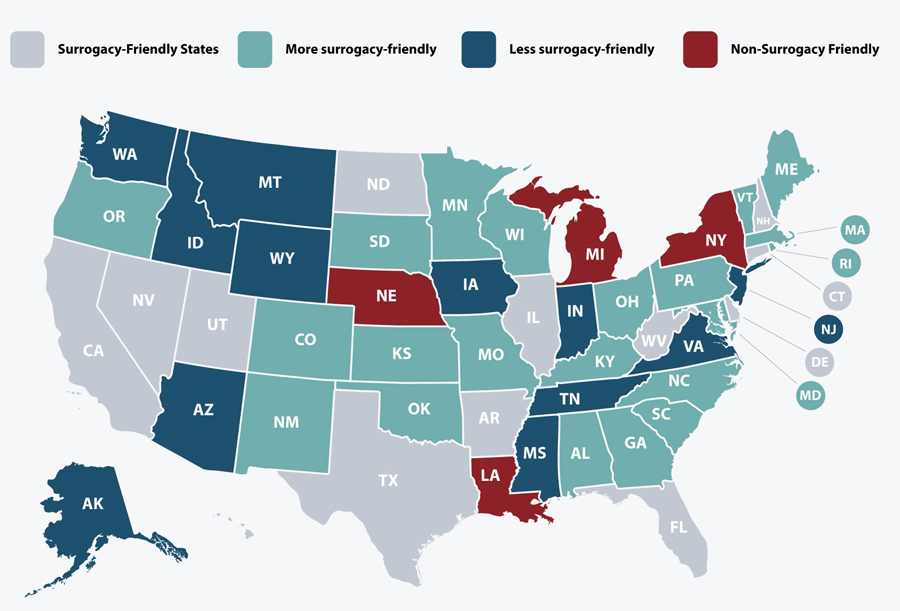Table of Content
Surrogacy laws in USA
Is surrogacy legal in USA
Surrogacy laws in USA are a bit complicated subject to debate given the variety of laws across every state in the country. Still, as you start your journey towards parenthood, we would recommend you connect with our professionals for the best advice and support.
By doing that, you can streamline your surrogacy process while avoiding all such complications related to USA surrogacy law. Well, you need not worry much as the below guide will certainly clear out most points regarding surrogacy laws.
Understanding the variation in surrogacy laws in USA
States with supportive surrogacy laws in USA
California: Judges have consistently upheld surrogacy agreements and pre-birth orders.
Connecticut: No matter their marital status, whether they are single or not, or whether they are biologically related to the child or not, Connecticut provides pre-birth orders to all intended parents.
Delaware: Prenatal plans and surrogacy contracts are expressly allowed in Delaware.
District of Columbia: A 2017 law has provided legal protection for commercial surrogacy agreements. As a result of ART procedures, the legal definition of parenting has changed.
Maine: As of 2016, pre-birth orders are allowed, with some limitations under surrogacy in USA.
New Hampshire: If the intended parents and the surrogate follow the established guidelines related to surrogacy for heterosexual couples in the USA, pre-birth orders and surrogacy agreements will be fulfilled.
New Jersey: In New Jersey, intended parents who use their own or donor eggs and sperm can easily obtain a pre-birth order.
Nevada: The law explicitly supports surrogacy agreements and pre-birth directives.
Washington: Gestational surrogacy is regarded as a “friendly” practice under state law in Washington. Even if neither of the intended parents has a biological connection to the child, the state allows married or unmarried couples, same-sex or heterosexual, to obtain a pre-birth order.
States in the USA that “Partially Favor” Surrogacy
Alabama: Married couples are the only ones who may place pre-birth orders.
Alaska: Despite the absence of laws here, surrogacy treatment has generally been accepted by US courts. Pre-birth orders are not particularly encouraged in this state.
Arkansas: According to a 2017 court decision, married heterosexual and same-sex couples who consent to surrogacy are covered by the law. In order to use a same-sex surrogate, a marriage between same-sex partners is necessary in the USA.
Colorado: Although there are no surrogacy laws in this state, the court will come of big support to the couples
Florida: Only married couples are permitted to use gestational surrogacy in Florida after the birth of a surrogate child.
Georgia: Although there are no specific regulations regarding surrogacy here, the judiciary has historically been supportive.
Hawaii: Prenatal orders are not permitted in Hawaii because there is no surrogacy-friendly legislation.
Illinois: As long as one parent is genetically related to the child, parents planning a pregnancy can obtain prenatal and postnatal orders.
Kansas: The courts have generally been supportive of surrogacy treatment, despite the fact that there is no law governing it in the USA. Moreover, there are options for case-specific prenatal orders.
Kentucky: The courts have generally been favourable even though there is no surrogacy legislation. If you’re married, you have the right to request a prenatal order.
Maryland: Intended parents may request prenatal and postnatal orders, but because there is currently no surrogacy statute enforcing surrogacy contracts, the court must make the decision regarding whether to grant parentage orders. A pre-birth order can typically be issued without any legal problems.
Massachusetts: Although there are no surrogacy laws in Massachusetts, the intended parents might expect some court support.
Minnesota: Although the intended parents might anticipate some court support, Minnesota has no laws.
Missouri: The post-birth order system in Missouri works well despite the state’s ban on pre-birth orders. People can obtain a post-birth order regardless of whether they are married or not, even if neither of the intended parents has a genetic connection to the child (same-sex or heterosexual).
Mississippi: There are no laws governing surrogacy, but the intended parents might expect some court assistance. Depending on the circumstances, the court might issue birth orders.
North Carolina: Gestational surrogacy is neither legal nor illegal in North Carolina, so the procedures and rulings of the courts vary greatly from judge to judge and county to county. Married intentional parents may be able to obtain pre-birth orders, but unmarried couples may encounter difficulties due to the ambiguity of state law.
North Dakota: They continue to act as the child’s legal guardians because one of the intended parents is also the child’s biological parent.
North Mexico: Although there are no surrogacy laws here, the intended parents might need some court assistance.
Ohio: In Ohio, obtaining a pre-birth order for a child is possible without going through the legal system. Individuals, married or unmarried couples (of the same sex or otherwise), and unrelated individuals are all eligible to obtain pre-birth orders, regardless of whether they have a genetic connection to the child.
Oklahoma: Surrogacy in Oklahoma is classified as “Partially Friendly.” Unmarried couples in Oklahoma are unable to obtain a pre-birth order with both of their names on it, despite state law permitting married intended parents, straight or same-sex, to pursue gestational surrogacy.
Even if they are not the child’s genetic relatives, single intended parents may apply for a pre-birth order.
Oregon: When at least one parent is a genetic relative of the child, the courts may issue pre-birth orders.
States in the USA with either no or partial surrogacy laws
Rhode Island: Although there are no surrogacy laws in Rhode Island, the intended parents might need some court assistance.
Pennsylvania: The Pennsylvania Superior Court has overturned lower court rulings that denied intended parents’ rights and surrogacy contracts, despite the lack of conclusive case law or legislative guidance. Parental orders are not always available across the state due to a lack of legislation.
South Carolina: Although there are no surrogacy laws in USA, South Carolina, the intended parents might need some court assistance.
South Dakota: Although there are no surrogacy laws in South Dakota, the intended parents might need some court assistance.
Texas: Contracts for gestational surrogacy can only be signed by heterosexual couples who are legally married.
Utah: Only legally married heterosexual couples are allowed to enter into gestational surrogacy contracts in Utah, and even then, only if a court review upholds the legality of the agreement after the child is born.
Wisconsin: Although pre-birth orders may receive court approval, post-birth orders are always necessary to establish legal parentage after the birth.
North Carolina: In North Carolina, heterosexual couples who are legally wed may use pre-birth orders.
States in the USA that allow surrogacy under certain circumstances
Iowa: Although there are no laws, the intended parents may need some court support. The argument that surrogacy agreements amounted to the sale of human beings was rejected by a local court decision.
Idaho: Despite the lack of legislation specifically governing surrogacy, pre-birth orders can only be granted if a couple uses their own eggs and sperm for IVF.
Montana: There are no laws or established precedents.
Nebraska: Commercial surrogacy contracts are prohibited. Legal agreements for charitable surrogacy are not permitted.
New York: If the intended parents live in the state and surrogacy agreements are legal, pre-birth orders may be requested as of 2021. To be eligible for a pre-birth order, the surrogate or at least one of the parents must have lived in the state for six months.
Tennessee: When the intended biological parents of the child are also the surrogate parents, as defined by local law, surrogacy agreements are permitted. The surrogate must give up her paternal rights if an egg donor is used.
Vermont: There are no laws that regulate the surrogacy industry. Pre-birth orders won’t be upheld by the courts, but post-birth orders might be.
Virginia: Surrogacy contracts for childbearing purposes are legal, but they are also subject to a number of intricate regulations. Instead, post-birth orders are typically issued.
States in the USA that outright prohibit surrogacy
Arizona: There, surrogacy agreements are illegal, and the surrogate is regarded legally as the child’s biological mother.
Indiana: Surrogacy is illegal in Indiana, and surrogacy contracts are also prohibited there. Because of this, Indiana is one of the few “unfriendly” states in the US to surrogacy. Even though a surrogacy agreement is ruled to be illegal, some courts will still issue parental orders.
Louisiana: Surrogacy is only permitted in Louisiana for married heterosexual couples using their own eggs and sperm.
Michigan: prohibits commercial surrogacy agreements. Anyone engaged in behaviour related to surrogacy may face legal repercussions.
Wyoming: Surrogacy is unregulated and not recognized by the law.
To find out more about surrogacy laws in USA and related topics, get in touch with one of our coordinators today





